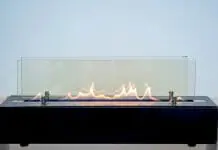- A heat exchanger is a way to efficiently use the heat generated from your fireplace instead of allowing it to escape up the chimney
- Incorporating a heat exchanger into your fireplace can help to lower your monthly heating bills all while heating your home so everyone’s happy!
- The way it works, cold air is drawn in from your living room, then it’s heated by the wood-burning fire, and promptly re-delivered back into your room as soothing warmth
- You can make your own DIY fireplace heat exchanger- check out this DIY guide down the page
- There are a bunch of different styles and purchase considerations- check out FireplaceDoorsOnline for detailed information and buying options
There are some different types- dome are mounted to the top of your fireplace’s opening. There are grate heaters, which are designed to fit within your firebox.
Contents
- What are fireplace heat exchangers?
- How do fireplace heat exchangers work?
- A DIY Heat Exchanger
- Benefits of fireplace heat exchangers
- 1) Reduced fuel consumption
- 2) No chimney smokes
- 3) Increased safety
- 4) Smoother heat
- Cons
- 1. Requires technical knowledge
- 2. Carbon monoxide risks
- 3. They are expensive to install
- 4. They don’t work for all burners
- 5. Dirt and soot
- The future of fireplace heat exchangers
- FAQs
- How does a fireplace heat exchanger work?
- What are the benefits of a fireplace heat exchanger?
- How do I install a fireplace heat exchanger?
- Why do I need a fireplace heat exchanger?
- What are the different types of fireplace heat exchangers?
- How much does a fireplace heat exchanger cost?
- How do I choose the right fireplace heat exchanger for my home?
- Can I install a fireplace heat exchanger myself?
- What are the benefits of a fireplace heat exchanger?
- Where can I buy a fireplace heat exchanger?
What are fireplace heat exchangers?
Fireplace heat exchangers are a device that allows airflow in one direction and out the other. The incoming air is preheated before entering the chimney. This improves the efficiency of heating with a fireplace and also reduces fuel consumption. On average, they return up to 70% more heat than conventional fireside setups.
How do fireplace heat exchangers work?
- Air enters through the bottom of the device.
- It goes to the stack and through the heat exchanger channel.
- Air heated, rises into the chimney and out of the house.
- Air enters at a higher temperature than it exited.
- It is mixed with cold air to maintain a constant temperature inside the living space.
A DIY Heat Exchanger
A DIY option for a fireplace heat exchanger is to install a metal box around the fire. This will help to reflect the heat back into the room, and will also create a barrier between the hot air and the cold air outside. You can find these boxes at most hardware stores, or you can make your own out of sheet metal.
Another option is to purchase a pre-made fireplace heat exchanger. These are typically made out of stainless steel, and they come in a variety of sizes to fit most fireplaces. They work by circulating the air around the fire, and they can be installed easily by following the instructions that come with them.
If you are looking for a more permanent solution, you can have a fireplace heat exchanger installed by a professional.
This is typically done by installing a metal box around the fire, and then running ductwork from the box to the outside of the house. This will help to circulate the air around the fire, and will also help to keep the heat from escaping up the chimney.
Benefits of fireplace heat exchangers
1) Reduced fuel consumption
They can reduce consumption by up to 70%, depending on the layout of the fireplace and chimney. By taking cold air from the outside and preheating it with the fireplace, they can increase your home’s maximum heat output.
2) No chimney smokes
The use of a fireplace heat exchanger will eliminate all smoke issuing from your chimney when you are using your fireplace. This will save you money on pollution and reduce the risk of fire caused by smoking. They also improve air quality in your home since there is less smoke emitted from the chimney when using a fireplace.
3) Increased safety
Using a fireplace heat exchanger will reduce the risk of carbon monoxide poisoning. They do this by preventing direct contact between the fireplace and chimney. The exchanger acts as an interface between the two parts and reduces the risk of any accidents.
4) Smoother heat
By regulating the temperature inside your home using a fireplace heat exchanger, you can get a more constant and smoother heat from your fireplace. This is done by mixing cold air with smoke at night time.
Cons
1. Requires technical knowledge
Some people find that the installation of the heat exchangers requires some skill and knowledge. This mainly relates to the installation of vents and pipes. They can be difficult, as well as expensive to install.
2. Carbon monoxide risks
If not installed or used properly, fireplace heat exchangers can pose a risk to your health because of carbon monoxide emissions from the fireplaces. They may emit too much carbon monoxide depending on design, location, chimney setup, and other factors. If they are not installed properly, they can also cause a risk of fire.
3. They are expensive to install
Despite the effectiveness and benefits of fireplace heat exchangers, they are still expensive to install. The cost can mean that they may not be worth installing, although the money will most likely be recouped in lower maintenance costs alone. Moreover, the installation can also be time-consuming.
4. They don’t work for all burners
Fireplace heat exchangers work best with true fireplaces, but not all fireplaces are true. Because of these circumstances, fireplace heat exchangers may not fit your situation. For example, fireplaces that have a flue liner in them will not be able to be used with a heat exchanger.
5. Dirt and soot
They can also get dirty, which may cause problems for your house. Dirt and soot build-up will reduce the effectiveness of your heat exchanger. It can also be a safety issue because of a reduction in the effectiveness of your fireplaces.
The future of fireplace heat exchangers
Fireplace heat exchangers are set to become more popular in homes over the next few years, especially for people who want to use their fireplaces as a source of heating. They are available from many different companies, and there is no reason why they won’t be widely used in the future.
There is a potential demand for them due to the link between efficient fireside heaters and lower energy consumption. They are becoming more popular even in homes of people who are heated by an oil furnace because they do not still have a brick chimney.
In Conclusion, fireplace heat exchangers are a useful device that can allow your fireplace to be more affordable and efficient in your home. In return, they provide numerous benefits that may outweigh their cost.
They also help protect your health as well as the environment. Although they have not caught on yet, they have a very high potential for success due to their low costs and beneficial features.
FAQs
How does a fireplace heat exchanger work?
A fireplace heat exchanger is a device that helps to improve the efficiency of your fireplace. It does this by circulating the hot air from the fire around the room, rather than letting it escape up the chimney. This can help to heat your home more evenly and efficiently, and can also help to reduce your heating bills
What are the benefits of a fireplace heat exchanger?
There are many benefits to using a fireplace heat exchanger. Some of these benefits include improved heating efficiency, reduced heating bills, and more evenly distributed heat in your home.
How do I install a fireplace heat exchanger?
If you are looking for a more permanent solution, you can have a fireplace heat exchanger installed by a professional. This is typically done by installing a metal box around the fire, and then running ductwork from the box to the outside of the house. This will help to circulate the air around the fire, and will also help to keep the heat from escaping up the chimney.
Why do I need a fireplace heat exchanger?
A fireplace heat exchanger can help to improve the efficiency of your fireplace by circulating the hot air from the fire around the room, rather than letting it escape up the chimney. This can help to reduce your heating bills and make your home more comfortable.
What are the different types of fireplace heat exchangers?
There are several different types of fireplace heat exchangers available on the market. Some of these include metal boxes, pre-made units, and professional installations. Each type has its own advantages and disadvantages, so it is important to choose the right one for your needs.
How much does a fireplace heat exchanger cost?
The cost of a fireplace heat exchanger will vary depending on the type that you choose. Metal boxes and pre-made units are typically the most affordable options, while professional installations can be more expensive. However, the long-term savings that you will experience with a more efficient fireplace may make it worth the investment.
How do I choose the right fireplace heat exchanger for my home?
There are several factors to consider when choosing a fireplace heat exchanger for your home. Some of these include the size of your fireplace, the type of fuel that you use, and the climate in your area. You will also want to consider the cost and the installation process before making a final decision.
Can I install a fireplace heat exchanger myself?
If you are handy with tools and have some experience with home improvement projects, you may be able to install a fireplace heat exchanger yourself. However, it is always best to consult with a professional before undertaking any major project like this. Installing a fireplace heat exchanger is not a difficult task, but it is important to make sure that it is done correctly in order to avoid any damage to your home.
What are the benefits of a fireplace heat exchanger?
There are many benefits of using a fireplace heat exchanger. Some of these benefits include improved heating efficiency, reduced heating bills, and more evenly distributed heat in your home. Fireplace heat exchangers can also help to improve the air quality in your home by circulating the air and keeping it from becoming stale.
Where can I buy a fireplace heat exchanger?
Fireplace heat exchangers are available at many home improvement stores and online retailers. You can also purchase them from some fireplace manufacturers. Before purchasing a fireplace heat exchanger, be sure to measure your fireplace and compare the measurements to the size chart of the product you are interested in. This will ensure that you purchase the correct size for your fireplace.



